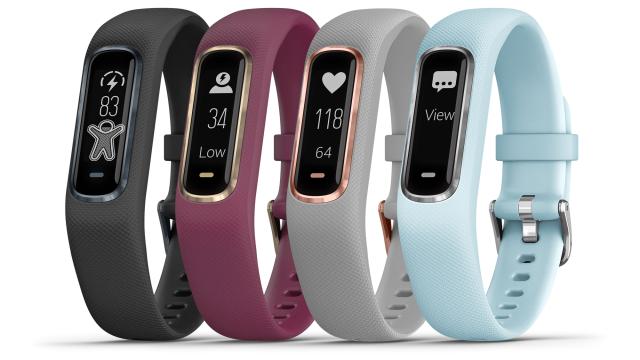If you compare all of the cheaper fitness trackers currently available, you’ll find a lot of similarities when it comes to their hardware, design, and functionality. So to make its new vívosmart 4 stand out, Garmin has instead tried to innovate on the software side by using all of the data the wearable is tracking to provide new insights about how your body is doing, including a new Body Battery feature that estimates your energy levels.
The vívosmart 4’s $US130 (we are still waiting on Australian pricing) price tag means the fitness tracker doesn’t include any GPS functionality, which is what Garmin’s products are typically known for, and which might make it a pass for hardcore runners.
But it does manage to squeeze an optical heart rate and pulse ox sensor into a wearable that looks quite a bit thinner than its predecessor, the vívosmart 3. It’s arguably a bit more stylish too, with a rubber strap available in fancy-sounding colours like berry, powder grey, and azure blue mixed with gold and silver bezels, but no one’s going to mistake it for anything other than a fitness tracker.
What makes the vívosmart 4 worth actually wearing all day long is a couple of software features that sound quite useful, if they work as promised. The aforementioned Body Battery uses data about your stress level (a feature introduced with the vívosmart 3), heart rate, quality of sleep, and overall physical activity to estimate your body’s energy levels throughout the day.
With a score closer to 100, Garmin suggests your body is ready for a vigorous workout, but when it drops closer to zero, it might instead be a good idea for you to catch up on rest and sleep. It’s not a definitive measurement by any stretch, but the metric might help you feel a little less guilty about skipping a workout when you’re just not feeling it.
Garmin also wants you to wear its new vívosmart 4 at night, as the heart rate sensor’s ability to also monitor pulse oximetry—the amount of oxygen in your blood—can help detect issues, such as sleep apnea, when it comes to your breathing while you slumber. The wearable can also use heart rate and motion data to estimate your body going through the various stages of sleep throughout the night, which can then be reviewed and graphed over time via the Garmin app on your smartphone so you can potentially figure out why you’re waking up so exhausted. It won’t give you any definitive solutions on how to sleep better, but the data could help you spot trends and correlations screwing up your slumber. Maybe your neighbours are cranking their tunes at 2am every day?
If you don’t mind the fitness-focused design, the vívosmart 4 is also a passable smartwatch alternative, boasting a waterproof housing, a battery that only needs to be charged about once a week, basic smartphone notifications including incoming calls, emails, and text messages. When paired with an Android device, the vívosmart 4 can even send canned text message responses right from the wearable—assuming, of course, the device’s Body Battery isn’t recommending you skip all social interactions as well.
[Garmin]
